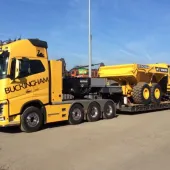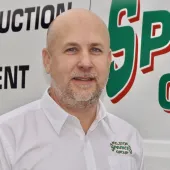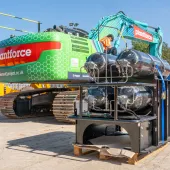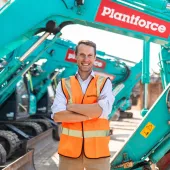Future Prospects for Heavy Plant Hire

First published in the February 2019 issue of Quarry Management as In the Hiring Line
With the UK equipment rental market currently worth around £3 billion a year, Dan Gilkes reports on how the heavy plant hire sector has prospered over the last decade and what the future holds in store
The UK has one of the most highly developed, mature equipment rental markets in the world, worth around £3 billion a year. Indeed, at the lighter end in particular, the vast majority of machinery is purchased or leased by plant hire companies. However, as the machinery gets heavier and more specialized, equipment buying is split more evenly between rental businesses and contractors.
In many cases, those two sectors of the market can be covered by the same companies, with the majority of earthmoving contractors offering equipment for hire as well as for use on their own projects. Companies such as CA Blackwell, Chepstow International, Jones Brothers and Walters Plant offer equipment hire, with or without operator, but can also form more of a partnership with the main contractor, where the plant business delivers more of a value-added service than simply supplying machinery.
‘2018 was another successful year for Walters,’ said Huw Richards, group managing director of Welsh earthmoving giants Walters Group. ‘Our offering these days is somewhat over and above traditional plant hire, in terms of offering long- and short-term rental solutions, including full maintenance, whilst also undertaking project work across many sectors on a partnering basis, offering value engineering and a cost-effective quality service.’
There has also been an equally positive upturn in demand for more conventional plant hire and machine supply though. Plenty of rental companies have been keen to invest in new equipment to boost fleet numbers, as demand continues to drive expansion.
‘It was a great year last year for plant hire and I think that 2019 will surpass that,’ said Merrill Lynch, director at L Lynch Plant Hire and Haulage. ‘We invested heavily last year and this year we will invest more. That is mainly on heavy equipment, we’re looking at dumptrucks and 70–80-tonne excavators this year.’
The heavy plant hire sector has prospered over the last decade, thanks in part to major government investment in infrastructure. Projects such as Crossrail, the A14 widening scheme in Cambridgeshire and HS2 require huge fleets of earthmoving equipment, far more than any single company could provide. As an example, once the main earthmoving stage starts, it is thought that HS2 alone will require literally hundreds of articulated dumptrucks on site. By working in partnership with the contractors involved in these major projects, rental companies have the security to invest in new machinery to meet these needs.
‘Major infrastructure projects such as the A14 are key in underpinning investment in heavy earthmoving equipment and a pipeline of such projects is imperative for the ongoing prosperity of the sector,’ said Huw Richards. ‘We have seen continued and sustained growth over the last decade. Further growth will be dependent on projects such as HS2 commencing in the foreseeable future. We do, however, continue to work to an aggressive fleet-replacement strategy.’
‘The A14 has been a hugely important project for us,’ agreed Merrill Lynch. ‘The Integrated Delivery Team there are tremendous partners to work with. They want to include us in strategic thinking, they want our input. They also really have a drive to include everybody in health and safety.’
However, there can be downsides to this type of close relationship on major projects, as the recent fall into administration of leading plant hire company Hawk Plant (UK) shows. The Shropshire firm, which boasts a fleet of more than 2,000 machines, ran into financial problems following the collapse of Carillion, one the main contractors working on several stages of the A14. With significant hire purchase and finance lease commitments, the pressure on cashflow became a problem for the hire company, though it is hoped that a buyer can be found for what has been one of the UK’s biggest plant businesses.
Of course, some plant hire companies prefer not to put machinery on long-term projects of this type, opting to service loyal customers away from the major infrastructure sites. They do, however, still benefit from the amount of machinery being used on those projects, as it increases demand for all elsewhere.
One relatively new company that has moved into the heavy plant rental business is TRU Plant, a division of Suffolk’s TRU7 Group, which also includes a tipper rental business, a demolition contractor and an aggregates recycler and supplier. Led by well-known rental expert Guy Nicholls, TRU Plant have rapidly expanded their heavy equipment range over the last two years, starting with articulated dumptrucks and moving into dozers and, increasingly, heavy excavators. However, the company’s phenomenal growth has come without supplying machines to the nearby A14 site, or indeed any of the country’s major projects.
‘You have to have people on a site like that all the time, for that sort of project,’ said Mr Nicholls. ‘There is plenty of other work around. We had a very good year in 2018 and I think 2019 will be even better. We will continue to add to the fleet this year and will go up to 50-tonne excavators.’
Many of the operational concerns for plant hire companies are the same whatever the customer base. At the time of writing a meaningful vote on Brexit in parliament was still awaited. However, whatever the outcome, companies are concerned about the supply of new equipment and essential spare parts.
‘OEM spare parts have been a challenge for a little while now and the various Brexit scenarios will add to this problem. We will look at implementing, wherever possible, certain mitigation measures,’ said Huw Richards.
‘Brexit is a concern with manufacturers, but they seem very confident that the equipment that we have ordered will get delivered,’ added Merrill Lynch.
Another major consideration for plant hirers providing operated machinery, particularly for longer-term projects, is the recruitment and retention of workers, though this is by no means limited to rental businesses.
‘There are fundamental concerns around the availability of skilled operators and service engineers. It is no doubt the industry’s biggest challenge,’ said Mr Richards. ‘Again, this is affected by the Brexit situation and the workload pipeline, with deferred start dates and threats of cancellation for numerous projects, such as the Wylfa Nuclear Power Station, HS2 and the M4 Relief Road.’
Many companies are actively looking to recruit operators in particular, while implementing internal training programmes to develop staff in-house. ‘We’re doing lots of recruitment campaigns, including a Careers-in-Plant programme,’ said Mr Lynch. ‘We are looking to recruit people from different industries and we’ve had great success with that. We took on 10 people over 30-years-old last year and we are looking to do a lot more this year.’
The UK plant hire business is in good shape, despite the unfortunate problems at Hawk Group. The house-building sector is strong, which supports smaller equipment rental, and as long as promised major infrastructure projects continue to progress as planned, the heavy equipment market should also continue to grow.
- Subscribe to Quarry Management, the monthly journal for the mineral products industry, to read articles before they appear on Agg-Net.com








